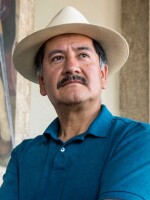Imagine sashaying into a night club, looking to get down to some thumping electro, only to hear swing music from the 1930s. That's just what you'd hear if you happen into a club where the band Caravan Palace is playing. The group had one of the top records in France last year. And if you hang for just a moment ... you'll be dancing.
Caravan Palace formed when the band was recruited to compose the soundtrack for a silent porn movie. Even with an anonymous beginning, last year the group sold over 150,000 copies of its first CD and reached No. 11 on the French album chart. At the heart of the group's popularity is a confluence of gypsy jazz, American swing from the '30s and a high-energy electronic beat.
Guitarist Arnaud Vial points out that back in the '30s and '40s, people danced to swing music, so combining swing and today's dance makes perfect sense. "We come back with this old stuff, with modern electronic beats and so people just think, 'Oh, I'm swinging, I'm swinging,'" he says. "Just they needed more, more bass!"
From the beginning the musicians were well aware that they would face all kinds of criticism from traditionalists -- especially gypsies, or Roma as they're more properly called, who depend on the continued interest in their music to make a living.
Violinist and Caravan Palace co-founder Hugo Payen says he was worried about their reaction. "We were very afraid of the reaction of gypsies, and really understood that we weren't here to do the same job as them," he says. "We were inspired by their music, by their culture ... so they listen to our music for what it is: dance music -- dance music inspired by their own culture."
Caravan Palace's three founding members, violinist Payen, guitarist Vial and bassist Charles Delaporte started out as jazz musicians, playing standards in a swing band. But this group of 20-somethings all had side projects with electronica bands.
Payen says they found a way to respect tradition and still have fun. "We didn't have the talent to do virtuoso music, very technical music, virtuoso exactly, so we asked ourselves to know what we found interesting in that style and, in my opinion, it was entertainment," he says. "We try to do that job, to entertain the people, and we found that it was a strong characteristic of our music."
The band's concert in Los Angeles drew an audience of nearly 4,000 dancers. The show's promoter, Leigh Ann Hahn, director of programming at Grand Performances, compares Caravan Palace to another Paris-based band that mixes tango with electronic beats. "Same way the Gotan Project did it. It's that same sort of hybridity that really works, where they're being respectful of the tradition but bringing it into the modern day sensibility," she says. "It's timeless music, it has an immediacy, it's classic, it's got great energy and you don't have to understand anything that's being sung. All you have to do is dance."
For its second album, Caravan Palace plans to stay true to the spirit of swing. Vial says the record will be more focused on the sound of the '40s, with an emphasis on brass instruments. "Now we like a lot of big band stuff, Count Basie, Duke Ellington, all this stuff," he says. "I think we're thinking about it for the second album, to make something maybe different, more you know, trumpets, trombones, stuff like this."
That will be the band's next challenge: finding the bridge between the sound of the big band era and the ever-changing electronic music landscape.
Copyright 2022 NPR. To see more, visit https://www.npr.org.



